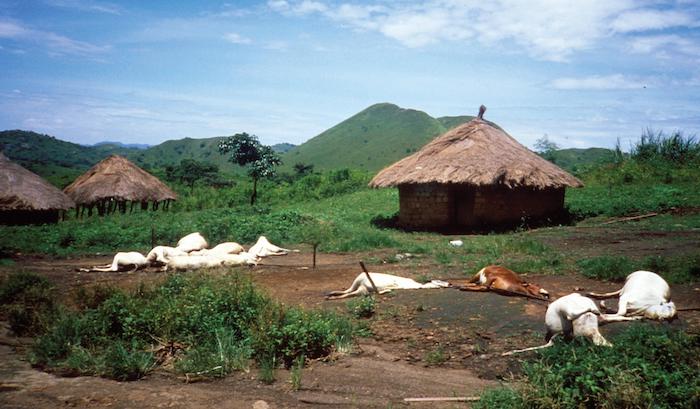Once a month here on the Molten Sulfur Blog, I run content taken from our book Archive: Historical People, Places, and Events for RPGs. This post is one of eighty entries in Archive, each more gameable than the last!
This post is brought to you by beloved Patreon backer Arthur Brown. Thanks for helping keep the lights on! If you want to help keep this blog going alongside Arthur, head over to the Patreon page – and thank you!

Limnic Eruption
Killer Fog
On the evening of August 21st, 1986, there was a deep rumbling beneath Lake Nyos in Cameroon, Africa. Within an hour, 1,700 villagers, 3,000 livestock, and countless wild animals around the lake were all dead, and outside experts had no idea why. The local government had received reports of a similar event almost two years prior in the area near Lake Monoun in which 37 people died under the same mysterious circumstances. The Cameroonian government initially blamed terrorists, while local legends suggested murderous spirits were responsible. An international investigation concluded the deaths were from mass asphyxiation via carbon dioxide.
Lake Nyos and Lake Monoun were the sources of the the sudden bursts of carbon dioxide. They’re active crater lakes formed centuries ago by volcanic eruptions. Like most lakes, they are naturally uneven in their water density. Colder water is denser, and sinks to the bottom of the lake, where it tends to stay cold and dense, trapping it below. Water pressure is higher at the bottom of a lake. The higher the pressure, the more dissolved gas it can hold. That’s why carbonated drinks aren’t fizzy until you open them. As long as the drink is sealed, it’s under high pressure, keeping the gas dissolved. As soon as you crack the seal and release the pressure, gas comes out of solution in the form of bubbles. Being located in active craters, Lake Nyos and Lake Monoun were exposed to a lot of volcanic gases, like carbon dioxide and methane. The gases were mostly dissolved in the high-pressure cold water at the bottom of the lakes. Anything that disturbed the lakes, forcing the cold water to the top, released the pressure on the gases, which all came out of solution at once, just like opening a can of soda. This is the the rare, deadly natural disaster known as a limnic eruption.
Toxic gases are rapidly expelled from the saturated lake, with disastrous effects. The gas is denser than normal air, so it may stay low to the ground, forming a poisonous fog that can be nearly invisible. At the Cameroonian lakes, it is likely mild earthquakes caused landslides that disrupted the waters, triggering the eruption of carbon dioxide. The deadly fog quickly rolled out from the lake, silently suffocating everything in its path. The result was a countryside littered with corpses.
Thousands died in the second limnic eruption, so preventative measures were developed despite the disaster’s rarity. Attempts have been made to gradually degas at-risk lakes, using siphons and pipe to mix saturated deep water and prevent lethal gas accumulation. One potential future threat is Lake Kivu, lying on the Rwanda-Congo border. It is one of Africa’s largest lakes, formed by volcanic activity, and rests near an active volcano. The lake is 2,000 times the size of Lake Nyos, and more people live near it. Local governments have aimed to remove large quantities of the deadly gases at the bottom of the lake, trying to prevent a much greater disaster.
Limnic Eruption in Play
Since a limnic eruption is such a lethal natural disaster, it is inadvisable to drop your PCs in the middle of one unless you really want them to die. Instead, they could walk into the aftermath of an eruption. A larger-scale limnic eruption like the one that could occur at Lake Kivu would suffocate an entire city. The mystery of what happened would be up to the PCs to resolve. They could consult scientists or spirits for answers. Without a clear cause of death, the eruption might provoke conspiracy theories and ‘retaliatory’ strikes on suspected enemies. Or maybe instead of investigating the aftermath of an eruption, your PCs could cause one. Reckless use of explosives might cause landslides into a volcanic lake, accidentally precipitating a limnic eruption. The party could even trigger an eruption deliberately to wipe out an enemy from afar. Any disruption to the lake’s waters could cause an eruption, so the possibilities are endless.
Rather get content like this in podcast form? Every two months I appear on the Dicegeeks podcast to talk about three recent posts. Here’s a link to my most recent episode!







